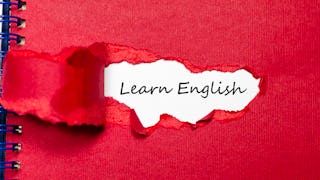If you struggle to express complex ideas in English, don’t worry! This course will lead you step-by-step on your journey to more advanced writing. In the first part of the course, you’ll learn some basic information about adverb clauses. Then, we’ll dive into the categories of ideas that adverb clauses express, and you’ll practice using subordinating conjunctions--the many grammar words that start adverb clauses. At the end of the course, you’ll learn how to use varied types of sentences in your writing, and you’ll show off all that you’ve learned by writing a paragraph. We’ll compare this final paragraph with one that you’ll write at the beginning of the course, and you’ll see the difference that adverb clauses can make.


Enhance your Writing with Adverb Clauses
This course is part of Learn English: Writing Effectively with Complex Sentences Specialization

Instructor: Meg Parker
Top Instructor
11,993 already enrolled
Included with
(60 reviews)
Skills you'll gain
Details to know

Add to your LinkedIn profile
See how employees at top companies are mastering in-demand skills

Build your subject-matter expertise
- Learn new concepts from industry experts
- Gain a foundational understanding of a subject or tool
- Develop job-relevant skills with hands-on projects
- Earn a shareable career certificate

There are 4 modules in this course
This week, before you start learning about adverb clauses, you’ll write a paragraph. Why? Because at the end of the course, you’re going to compare what you can write now with what you’ll be able to write then--after you’ve learned about adverb clauses. After writing, you’ll start learning new lessons. You’ll learn how to identify adverb clauses, to create sentences with them, and to punctuate them correctly with commas. For each lesson, you’ll learn from some videos, practice exercises on your own, and take a quiz to check your understanding. Are you ready? There’s a lot to learn, so let’s get started!
What's included
9 videos3 readings3 assignments1 discussion prompt
Welcome to Week 2! This week, we’ll examine some common connecting words called subordinating conjunctions. We’ll specifically focus on conjunctions of time, place, cause, and contrast. You’ll watch lesson videos and videos that give you guided practice with using these types of adverb clauses correctly. At each step, you’ll practice on your own, check your answers, and complete quizzes to test your knowledge. Finally, you’ll apply what you learned by writing complex sentences with adverb clauses. We’ll go step-by-step so that you can feel confident using new adverb clauses. Let’s get started!
What's included
5 videos2 readings2 assignments1 discussion prompt
This week, we’ll continue in our exploration of the meaning and use of adverb clauses. First, we’ll learn about clauses of condition, which are very common in the everyday language of fluent English speakers. After conditional clauses, you’ll learn about common mistakes with adverb clauses, and this knowledge will help you to check and edit your own writing when you write conditional sentences in a discussion post. By the end of this week, you’ll have learned what you need to know in order to successfully write with adjective clauses in the last part of the course. Good luck!
What's included
4 videos2 readings2 assignments1 discussion prompt
This week, we’ll focus more on writing. First, you’ll learn about writing with a variety of sentence structures. Then, you’ll write a paragraph about your routine--again! You did this in Week 1, but now, you’re going to show off everything you’ve learned about sentence types and adverb clauses. After writing, you’ll compare this week’s writing with Week 1’s writing, and you’ll be able to see how much more advanced your writing is now--thanks to adverb clauses. Finally, you’ll finish by evaluating another learner’s use of adverb clauses. You’ve worked hard, and now’s the time to see the results of your effort. Congratulations!
What's included
3 videos2 readings1 peer review1 discussion prompt
Earn a career certificate
Add this credential to your LinkedIn profile, resume, or CV. Share it on social media and in your performance review.
Instructor

Offered by
Explore more from Learning English
 Status: Free Trial
Status: Free TrialUniversity of California, Irvine
 Status: Free Trial
Status: Free TrialUniversity of California, Irvine
 Status: Free Trial
Status: Free TrialUniversity of California, Irvine
 Status: Free Trial
Status: Free TrialUniversity of California, Irvine
Why people choose Coursera for their career




Learner reviews
60 reviews
- 5 stars
90%
- 4 stars
8.33%
- 3 stars
0%
- 2 stars
0%
- 1 star
1.66%
Showing 3 of 60
Reviewed on Feb 5, 2023
My big thanks to the instructor for providing this course. It's easy to follow and well-structured, and for me, it helps to organize my writing sentences.
Reviewed on Mar 30, 2023
It's excellent. Now I can use adverb clauses well, and I understand compound, complex, and compound-complex sentences better than before. Thanks for the course. I appreciate it.
Reviewed on Jan 8, 2022
This course (and specialization) enriched not only the way I write in English but also in my native language as well.

Open new doors with Coursera Plus
Unlimited access to 10,000+ world-class courses, hands-on projects, and job-ready certificate programs - all included in your subscription
Advance your career with an online degree
Earn a degree from world-class universities - 100% online
Join over 3,400 global companies that choose Coursera for Business
Upskill your employees to excel in the digital economy
Frequently asked questions
To access the course materials, assignments and to earn a Certificate, you will need to purchase the Certificate experience when you enroll in a course. You can try a Free Trial instead, or apply for Financial Aid. The course may offer 'Full Course, No Certificate' instead. This option lets you see all course materials, submit required assessments, and get a final grade. This also means that you will not be able to purchase a Certificate experience.
When you enroll in the course, you get access to all of the courses in the Specialization, and you earn a certificate when you complete the work. Your electronic Certificate will be added to your Accomplishments page - from there, you can print your Certificate or add it to your LinkedIn profile.
Yes. In select learning programs, you can apply for financial aid or a scholarship if you can’t afford the enrollment fee. If fin aid or scholarship is available for your learning program selection, you’ll find a link to apply on the description page.
More questions
Financial aid available,
¹ Some assignments in this course are AI-graded. For these assignments, your data will be used in accordance with Coursera's Privacy Notice.

